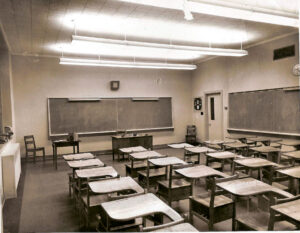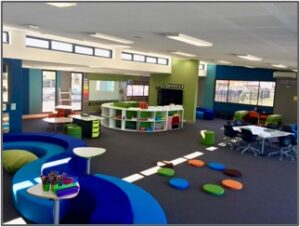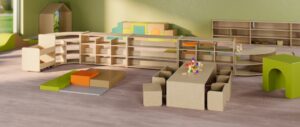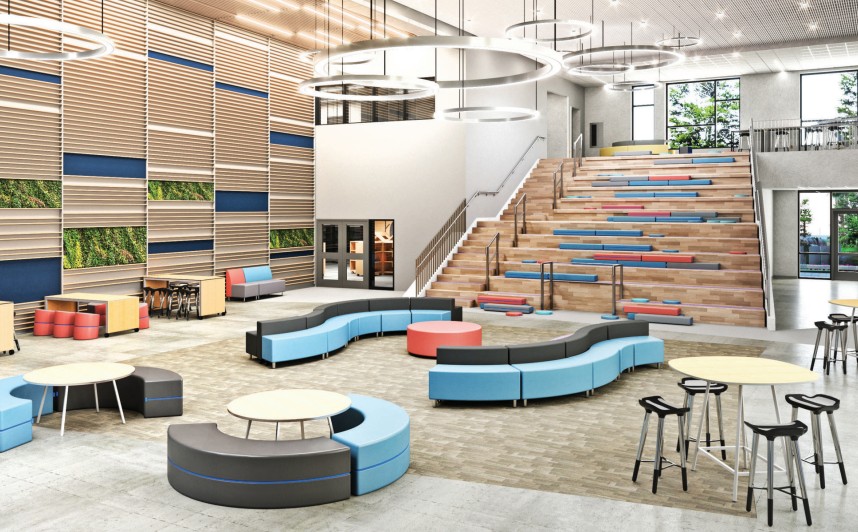Universal Design for Learning (UDL) is an educational framework that guides the design of accessible and inclusive learning environments by providing multiple means for learners to engage with information, demonstrate understanding, and navigate the curriculum.
Why is this important?
 At the turn of the twentieth century, standardized classroom design focused on a school’s responsibility to develop factory workers to support the growing need of industry. The primary focus was on discipline, order, and efficiency. The most recognizable feature was fixed rows of individual wooden desks facing the front. This arrangement emphasized teacher-centered instruction, conformity, routine, and uniformity. Individuality and creative thinking would have been actively discouraged.
At the turn of the twentieth century, standardized classroom design focused on a school’s responsibility to develop factory workers to support the growing need of industry. The primary focus was on discipline, order, and efficiency. The most recognizable feature was fixed rows of individual wooden desks facing the front. This arrangement emphasized teacher-centered instruction, conformity, routine, and uniformity. Individuality and creative thinking would have been actively discouraged.
Today, we live in a world that will need creative, inclusive, problem-solvers to forge a successful future. As a result, the philosophies that shape the way we think about learning spaces and influence our designs, move beyond traditional, outdated knowledge-based standards and instead prioritize equity, inclusivity, engagement, agency and adaptability.
Brezach is one of very few contract furniture companies in Canada dedicated to creating spaces in the education sector using UDL. We have invested in building a knowledge base over the last 12 years and have learned from like-minded groups and industry leaders in order to differentiate ourselves from the hundreds of others that sell furniture that simply happens to fit into a school. We understand that designing educational spaces with a UDL philosophy involves a fundamental shift in how we view knowledge, teaching, the student experience, and classrooms spaces. We are dedicated to helping educators create spaces that support them in achieving the desired student outcomes. We truly believe that space matters.
Key philosophies that influence and guide our approach to planning spaces that matter include:

Learner-Centered Philosophy: At the heart of UDL is the belief that every student learns differently. Instead of designing for the “average” learner, environments are created to support multiple means of engagement, representation, and expression. Students interact with content, teachers, and each other. We plan spaces that allow the participants to demonstrate learning, and stay motivated.
Constructivist Learning Theory: Rooted in the idea that learners construct knowledge through experiences and self- reflection, the spaces we create, need to support active, inquiry-based, and experiential learning.
Equity and Accessibility: UDL is deeply connected to equity in education—ensuring that learning environments remove barriers, not reinforce them. Accessibility is not an afterthought, but a central design tenet.
Innovation and Lifelong Learning: We believe that innovation and creativity are not solely dependent on a particular setting but deeply routed in the culture that the school is striving to create.
Holistic Wellness and Human Development: We acknowledge the interplay between environment, mental health, and student performance. Emotional safety, social connection, and physical well-being are critical to learning.
Quality through purposeful design and inclusive thinking: Designing for UDL doesn’t mean sacrificing academic rigor. It’s about creating quality learning opportunities that are accessible, meaningful, and transformative for all learners. We need to incorporate empathy and diverse perspectives of both the teachers and students into the design process. Learning environments must reflect the lived realities of all that use the space.
Reflective Practice and Continuous Improvement: Design is not static and environments must evolve with feedback, emerging research, and changing student needs.
Twelve years of a young person’s life should not be a road to poverty but an open door to a life full of wonderful potential.
 The philosophies shaping 21st-century classroom design under the Universal Design for Learning framework reflect a shift from standardization to personalization, from knowledge transmission to knowledge sharing and construction, and from exclusion to intentional inclusion. These philosophies demand educational spaces that are dynamic, equitable, reflective, and student-empowering—spaces that not only meet diverse learning needs but also elevate the quality of learning itself.
The philosophies shaping 21st-century classroom design under the Universal Design for Learning framework reflect a shift from standardization to personalization, from knowledge transmission to knowledge sharing and construction, and from exclusion to intentional inclusion. These philosophies demand educational spaces that are dynamic, equitable, reflective, and student-empowering—spaces that not only meet diverse learning needs but also elevate the quality of learning itself.
Over the last 12 years the Brezach Solutions team has helped hundreds of schools from all regions in Canada create innovative, functional, and welcoming spaces that serve the needs of all learners. Whether creating classrooms, libraries, sensory rooms, leaning commons, common areas or administrative spaces; we understand that we are co-stewards of funds dedicated to improving the learning experience and we are keenly aware of our responsibility to ask questions, challenge traditional space plans help mitigate the risk of purchasing the wrong furniture. We take our responsibility seriously and firmly believe that the space we help create must emphasizes skills like creativity, adaptability, and collaboration—critical for life beyond school.

